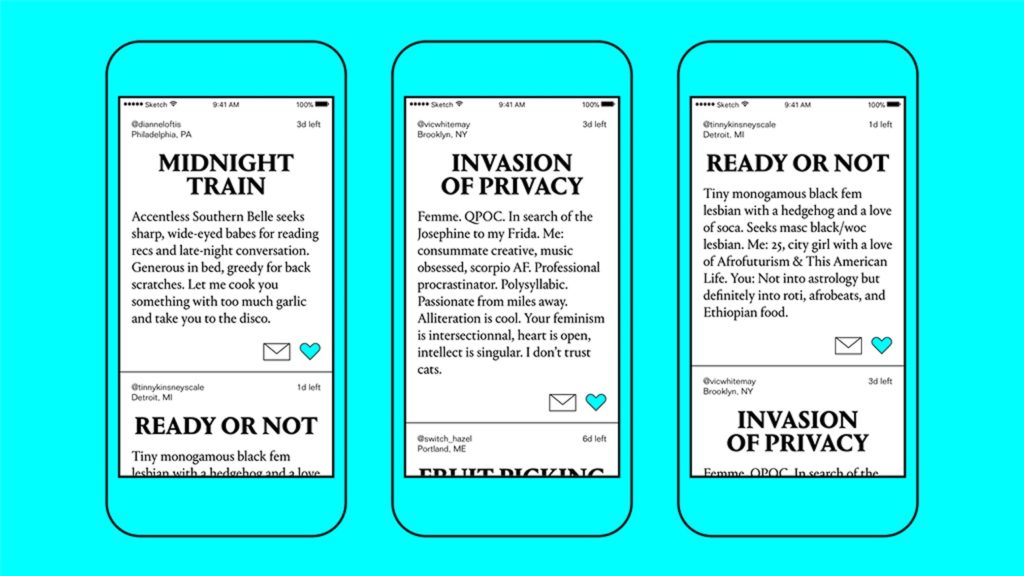
Sixteen years ago, Anji Fipps posted a personal ad on shoe.org, “The Online Lesbian Community.” “Hi all,” she wrote. “This is my first time posting to the list although I have responded to a few posts. I just wanted to do alittle intro. [sic] I live in wonderful South Carolina. I am 29 but try not to act it.. lol.. I have kids and I just got out of an 8 yrs lesbian relationship. I am looking for friends to chat with, email, maybe even visit one day.. I live in a small town so meeting new people isn’t easy.”
The most recent update to Fipps’ bio states that she is 40 and in a happy relationship—but if she were still searching for love, she would have found a home at Personals, an upcoming queer dating app. Inspired by vintage personal ads, the service encourages less represented groups within the LGBTQ community like “QPOC, people with children, 40+ crowd, rural queers, people with disabilities, people with chronic illnesses, [and] asexuals worldwide” to join and find love and community.
Personals began as a spin-off of Kelly Rakowski’s Instagram-based education project, @h_e_r_s_t_o_r_y, which served to promote “dyke imagery [and] lesbian herstory, from pop culture to high art.” @herstorypersonals, now simply @_personals_, is a virtual backpage of distinctly queer personal ads that echo the personal ads from the iconic lesbian magazine “On Our Backs.” A far cry from the image-based sterility of services like Tinder and Bumble, @_personals_ is unique, quirky, and distinctly queer, full of “nonbinary nature witch[es],” “aspiring Latinx daddies,” “plant obsessed brown femme[s] with soft butch haircut[s]” and the like.
There is a distinct sense of queer ownership in Personals that feels friendlier than most dating apps. The landing page of the Personals website displays a picture of a lo-fi, newspaper-esque personal ad reading, “ANDRO CREATIVE. Gently non-binary who will paint your likeness in landscapes, teach you to read clues left by lichens, and bake sourdough on weekends.” Personals negotiates in queer culture and queer terminology; instead of fitting the complexities of queer identity and dating math into the binary of a simple swiping app, Personals was made for the WLW (woman loving woman) and trans experience and accommodates the search for friendship and for romance—both monogamous and polyamorous.
Furthermore, there is a trendy sense of nostalgia to both the Instagram account and the upcoming app. The text-based, newspaper style not only pays homage to an important part of queer history, but provides more space for nuance than a picture can. There is a sense of relief in the lack of images, with users being given total control over how they want to present themselves, something particularly valuable to the trans community. There are no pull-down menus that read “man, woman, or other,” or hitboxes to select one binary gender. All Personals has is a blank text box for you to describe yourself in whatever terms you please. Frankly, it’s liberating.
The Personals brand has its fair share of struggle—like intellectual property conflicts with a similar service called QPOC Personals—but overall, it has created a positive space online for queer women. It is undeniable that the Personals brand will make mistakes and run into problems in the future, but being the first service of its kind its presence is still valuable nonetheless.
The growing cult of @_personals_ users proves that technology’s race forward has left behind a network of queer women who better navigate the intimacy of classified ads than high tech dating apps. Despite the high tech capabilities of Ragowski and other LGBTQ tech leaders, the way the queer community cherishes our history has made impossible that we would abandon the simple personal ad, and the sense of ownership they bring by allowing queers from the 1970s to 2019 to describe ourselves in our own terms.
